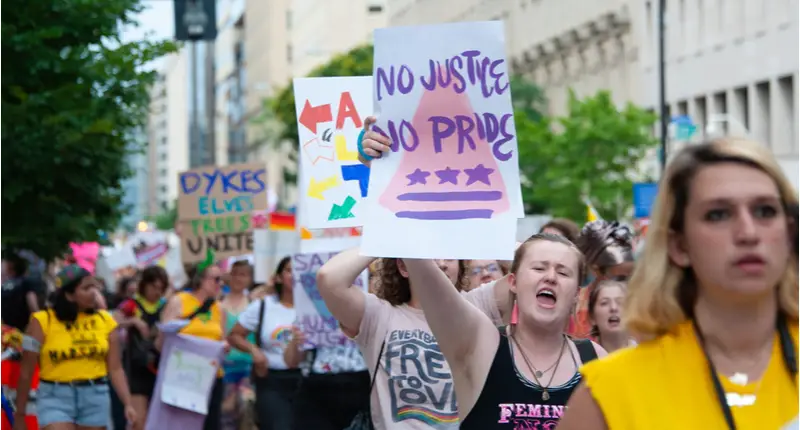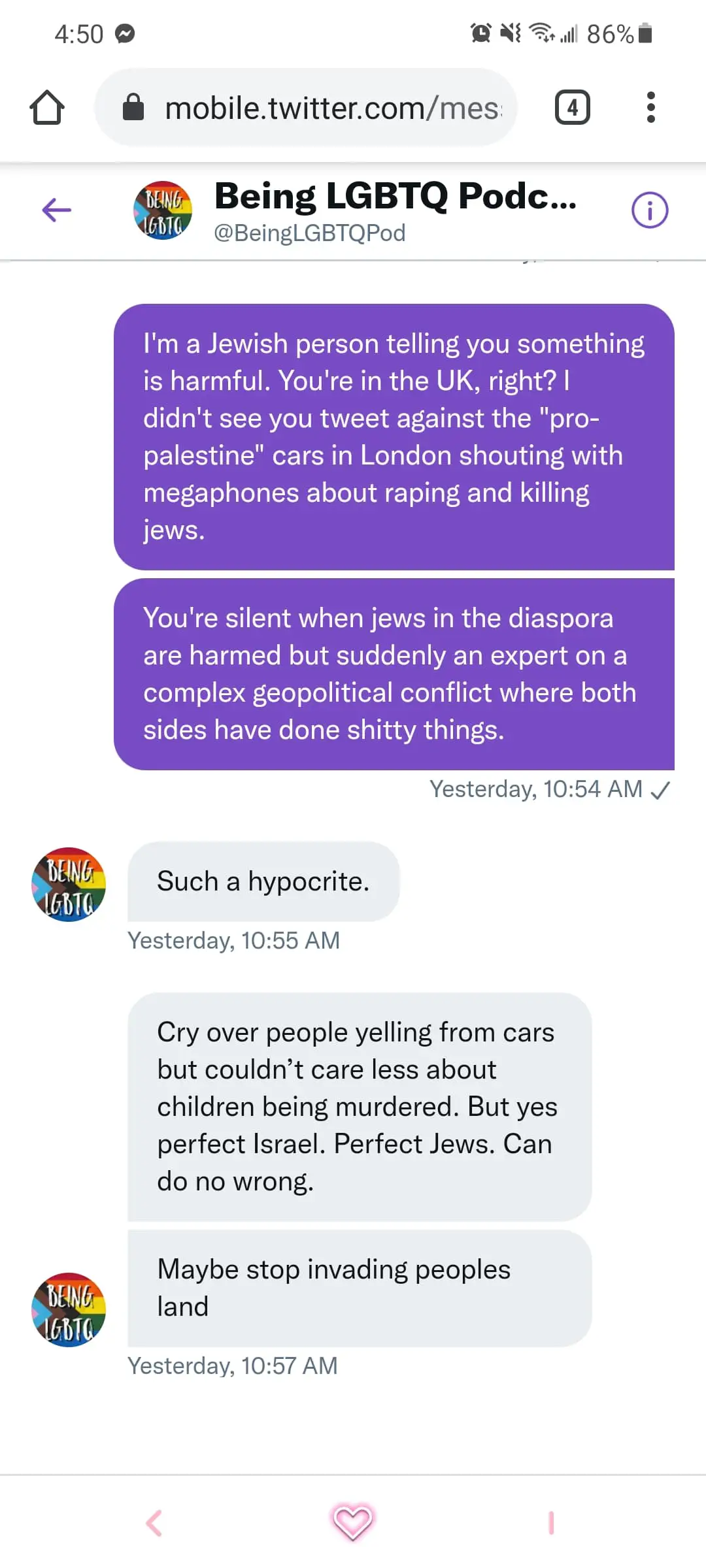
“Well I know that Jewish people are always the victims. I’m aware of that. Jews are perfect I know :)”
I read it again, shocked and in disbelief. I was discussing, as a Jewish person, why some of the comments this LGBTQ+ podcaster (with many thousands of followers) made on Twitter were inappropriate right now. We had worked together in the past – I was on their podcast as a guest a few years ago. At a time when hate crimes against Jews in the diaspora are rising amid tensions between Israel and Palestine, I thought I could compel someone whose podcast slogan is “where all voices matter” to be sensitive to Jewish suffering right now. What I thought would be an intense but meaningful discussion dissolved rapidly into blatant Jew-hate.
“I’ve got a slight feeling you need to get over yourself. Crying on. Just like a broken record. Just want you to shut up,” he continued, before blocking me.

This is just a recent example of a disturbing trend I’ve seen permeating the LGBTQ+ community over the years. From instances like the Chicago and DC Dyke Marches where queer Jews were banned from waving Star of David flags to more recent phenomena of queer celebrities (looking at you, Indya Moore) and media personalities posting inflammatory, inaccurate “infographics” which minimize Jewish history and trauma to their thousands upon thousands of followers, there seems to be a resentment of Jewish people building in the community.
i see noname and indya moore are at the antisemitism again. imposing the black/white struggle in america onto israel/palestine is grossly erroneous and innacurate, deleting jewish identity and the jews’ indigenous right to israel.
— Eve Barlow (@Eve_Barlow) July 20, 2020
Aye, a non-binary friend of mine, recalls mentioning they were Jewish in their profile on the LGBTQ+ dating app HER. “Someone I matched with said she didn’t f*** with zios even though the only thing I even mentioned was being Jewish,” Aye, age 31 from Virginia, says.
It should be noted that “Zio” is an antisemitic slur coined by former KKK Grand Wizard David Duke. The fact this violent term is being used in leftist circles now, despite calls for anti-racist action, is at once ironic and horrifying. Indeed, the Chicago Dyke March used the term on social media following the ejection of Jewish lesbians from their event in 2017.
“The problem here in the LGBTQ+ community is that there is a lot of antisemitism coming from the radical left wing political parties which many adhere to. Their support for a ‘free Palestine’ often turns into shouting antisemitic slogans like ‘from the river to the sea,’” explains Nina, a 57-year-old living in Florence, Italy. “When we try to have a dialogue within the community we are often accused of being fascists since we support Israel. Most of us have given up trying to have that dialogue.”
Similar things are happening throughout the diaspora by progressive groups claiming to align with the Palestinian cause. In the UK, antisemitic hate crimes are up over 400% since the latest flare-up in Israel-Palestine began. In Los Angeles, Jews are getting beat up while outdoor dining. In New York, my own city, a Jewish man was chased down the street by an angry group of protestors and Jews had fireworks thrown at them. I’ve seen posts by Jews on social media urging members of their community to remove kippahs and Stars of David, to stay at home as much as possible, to stay safe.
The events occurring across the world in the Middle East are leading to real harm to Jews in the diaspora, who feel scared, ignored, and isolated.
“As the violence in Gaza and Israel continues, I see numerous so-called ‘intersectional’ social justice accounts and spaces reporting completely one-sided narratives of the situation. I see how this rhetoric leaves Jews of color, LGBTQ+ Jews, feminist Jews, and other intersectional Jews being abandoned by what we once found to be safe spaces,” writes Amy Albertson, an Asian-American Jewish woman.
This is not okay.
The voices of Jewish people, who have historically shown up for social justice movements, are being silenced and erased. When it’s time for people to show up for us, we are met with silence. For LGBTQ+ Jews, who live at the intersection of more than one marginalized identity, Israel is used as a weapon, a litmus test, to keep us from participating in the movements we care about.
“I’ve gotten to the point that if I mention I’m Jewish to many leftists in the queer community, I’m immediately given the ‘good Jew’ test,” Spencer, a 30-year-old cis gay man from California, tells me as he discusses the instances of antisemitism he faces with his husband, a trans man.
If LGBTQ+ Jews dare bring up how Israel, where roughly half of all the world’s Jews live, is also a safe haven for LGBTQ+ people in the Middle East (you know, a region where gay people are still publicly hung, “honor killed”, and facing other atrocities), we are accused of pinkwashing. “Pinkwashing” implies that Israel is only LGBTQ+ friendly to cover up for their abuses against the Palestinian people. It’s a cynical conspiracy that not only delegitimizes the existence of queer Israelis, but paints the Jewish state as some sneaky, insidious being trying to “trick” the world. Sounds a lot like classic antisemitism, rebranded.
It is clear that the LGBTQ+ community at large must grapple with where their Jewish siblings belong in their movement. Pushing us out, should we happen to fail this trial imposed on us where we must denounce half the world’s Jews for surviving pogroms, expulsions, and even genocide, does nothing to advance the cause. If anything, it just proves to many diaspora Jews that we will never be fully accepted. As history has shown us, when antisemitism reemerges in society, it often masks itself as social justice. From the antisemitism of Hitler disguised as “anti-globalism” to the antisemitism of the Soviet Union disguised as “anti-capitalism” (and yes, even “anti-Zionism”), societal shifts have often led to the oppression and scapegoating of Jews in one form or another.
So please, don’t fall victim to this reemerging pattern in society. Listen to Jews. Learn more about our history, globally. After all, if we don’t learn from history, we are bound to repeat it.




